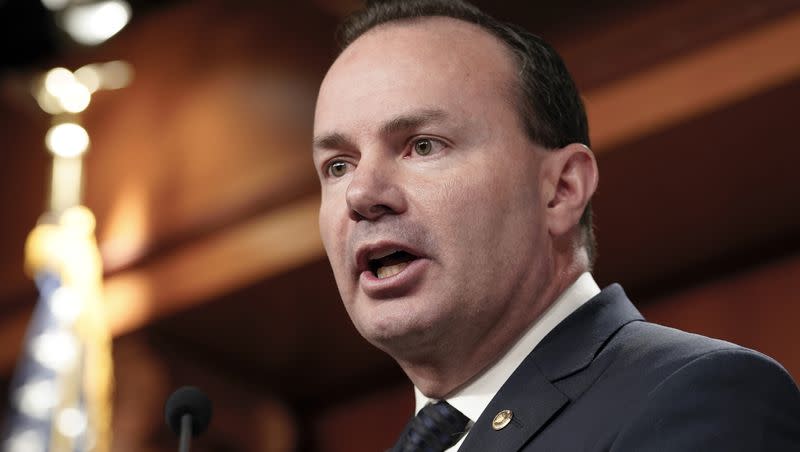Sen. Mike Lee co-sponsors bipartisan PRESS Act, giving journalists protection from federal entities

- Oops!Something went wrong.Please try again later.
- Oops!Something went wrong.Please try again later.
- Oops!Something went wrong.Please try again later.
The Protect Reporters from Exploitative State Spying Act (PRESS Act), co-sponsored by Utah Sen. Mike Lee, passed unanimously in the House last Saturday and will move to a vote in the Senate.
Lee joined Sens. Dick Durbin, D-Ill., Ron Wyden, D-Ore., and Lindsey Graham, R-S.C., as co-sponsors of this bill.
The PRESS Act aims to provide better protection for journalists and their sources from federal government agencies. The bill prohibits federal entities from forcing journalists to reveal protected information unless they issue a subpoena with substantial proof it’s necessary, per the House background material.
A press release from Wyden’s office explained, the PRESS Act comes “in response to multiple examples, in both Democratic and Republican administrations, of law enforcement agencies secretly subpoenaing emails and phone records from reporters in order to determine their sources.”
If passed in the Senate, a federal entity will only be allowed to request information if obtaining it identifies a “perpetrator of terrorism” or prevents “imminent violence, significant bodily harm, or death.”
The PRESS Act broadens the classification of ‘journalist’
The bill also redefines “journalist” more broadly as “a person who regularly gathers, prepares, collects, photographs, records, writes, edits, reports, investigates or publishes news or information that concerns local, national or international events or other matters of public interest for dissemination to the public.”
This clarification includes protections for independent journalists. In 2023, Pew Research published data on freelance journalists, including that 34% of all reporting journalists are self-employed.
Said Lee: “In a world where information is power, the role of reporters as truth-seekers and watchdogs cannot be understated,” per a press release from co-sponsor Wyden.
Some law enforcement agencies have tried to “unmask confidential sources” by “clandestine tactics,” including subpoenas of emails and phone records, Lee added.
This bill is more protective than the 2013 Free Flow of Information Act
Sen. Chuck Schumer, D-N.Y., introduced the most recent journalist protection act in 2013. The PRESS Act provides more explicit details on who qualifies as a journalist, the conditions under which a federal entity can request information and the guidelines of protection.
In the 2013 bill the wording was looser regarding requirements necessary to federally request documents. Judges ruled on whether the federal entity needed the information based on whether it was “essential to the resolution of the matter.”
In the 2024 bill the judge would rule based on if “there is a reasonable threat of imminent violence unless the testimony or document is provided” and requires the federal entity to submit a testimony on why they are requesting it.
Lee described this legislation as “imperative to shield journalists from unnecessary government surveillance” and added that it also protects the American public. “We must seize this opportunity and ensure that the Fourth Estate remains an indomitable force in its quest for truth,” he said.
Bipartisan support and bipartisan opposition
Sen. Tom Cotton, R-Ark., opposes the bill, saying it “would open a floodgate of leaks damaging to law enforcement and our nation’s security.”
Cotton cited instances of news organizations interfering with public opinion during several wars. He referenced The New York Times publishing the “Pentagon Papers” during the Vietnam War, adding, “The press routinely revealed details about America’s efforts to hunt down terrorists — details that helped our enemies cover their tracks and evade justice.”
On the other hand, Durbin supports the bill, saying “The First Amendment’s guarantee of a free press is fundamental to holding politicians and others in power accountable,” per Wyden’s press release.
Durbin is reintroducing the bill in the Senate “to ensure that journalists have the necessary protections to speak with their sources and do their jobs effectively without undue government interference.”
Reps. Kevin Kiley, R-Calif., and Jamie Raskin, D-Md., introduced the legislation in the House.

